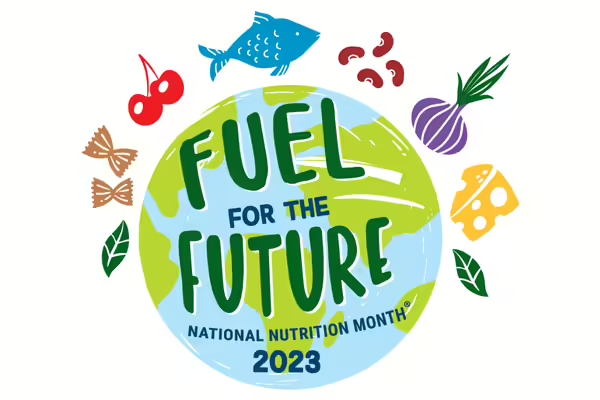
March is National Nutrition Month®, which is a nutrition education and information campaign sponsored by the Academy of Nutrition and Dietetics. It invites everyone to learn about making informed food choices and developing sound eating and physical activity habits.
2023 will be its 50th anniversary, and the theme for this year is Fuel for the Future. One way we can fuel for the future is to eat with the environment in mind. Buying foods in season and shopping locally, when possible, not only benefits the planet, but it also may help you keep food costs down. Enjoying more plant-based meals and snacks is another option. Try more meatless meals or substituting some or all of the meat in recipes with plant-based proteins.
Beans and Lentils
These plant proteins are often overlooked. Beans and lentils are versatile and can be added to many dishes. Beans provide about 20 grams of protein per ½ cup, and lentils provide 9 grams per ½ cup. Beans and lentils are also an excellent source of fiber. Just ½ cup will provide 7-8 grams of fiber. Aim for 25 grams of fiber per day.
Cooking with Lentils
Lentils do not require soaking like other pulses, such as beans, peas, and chickpeas.
- Rinse your lentils with fresh water before boiling to remove any dust or debris.
- Cook on stovetop, using 3 cups of liquid (water, stock, etc.) to 1 cup of dry lentils.
- Bring to a boil, cover tightly, reduce heat and simmer until they are tender. Whole lentils (green) take 15-20 minutes and split lentils (red) will take just 5-7 minutes to cook.
- Cooked lentils can be refrigerated for up to one week, or frozen for up to three months.
Health Benefits
Beans, peas, lentils and chickpeas (pulses) are all high in fiber and protein, as well as a significant source of vitamins and minerals such as iron, potassium, zinc, folate and magnesium. They also contain phytochemicals which possess antioxidant and anti-carcinogenic effects.
Pulses have been shown to reduce cholesterol, blood pressure, and inflammation which is an indication that they have the potential to reduce the risk for several chronic diseases such as cancer, heart disease and diabetes. Including only ½ cup of these per day can greatly enhance diet quality!
Plant based recipe ideas
Sweet Potato & Lentil Dip
Ingredients:
- 2 cups peeled and cubed sweet potato
- 1 Tablespoon oil for roasting sweet potatoes
- ½ cup cooked red lentils
- 2 Tablespoons fresh lemon juice
- 2 Tablespoons extra virgin olive oil
- 1 Tablespoon tahini
- 1 garlic clove, minced or chopped
- Salt and pepper to taste
Optional garnish: red pepper flakes or sumac
Instructions
- Preheat oven to 375˚F. Wash hands. Line a baking sheet with parchment paper.
- In large bowl, toss together sweet potato, oil, salt, and pepper. Dump onto the prepared baking sheet, arrange in a single layer, and bake for 30-35 minutes. Stir occasionally.
- The sweet potatoes will be golden and tender when done. Remove from oven and let cool to room temperature.
- Place sweet potatoes, lentils, lemon juice, oil, tahini, and garlic into the bowl of a food processor. Process until smooth. Adjust seasoning with more salt and pepper, if needed.
- Scrape the dip into a bowl. Drizzle with more oil, and sprinkle with red pepper flakes or sumac. Serve at room temperature.
**To reduce cooking time, pressure cook sweet potatoes instead of roasting**
SERVING SIZE 1/4 cup (60 mL) NUTRITIONAL ANALYSISCalories 90, Total Fat 5 g, Saturated Fat 0.5 g, Cholesterol 0 mg, Carbohydrates 10 g, Fibre 2 g, Sugar 2 g, Protein 2 g, Sodium 90 mg, Potassium 171 mg, Folate 28 mcg
- Recipe adapted from www.pulses.org
- Get details on breakfast hacks at: bit.ly/HealthyBreakfastHabits
- Get easy breakfast recipe ideas at go.illinois.edu/EasyBreakfastIdeas
Illinois Extension leads public outreach for University of Illinois by translating research into action plans that allow Illinois families, businesses, and community leaders to solve problems, make informed decisions, and adapt to changes and opportunities.